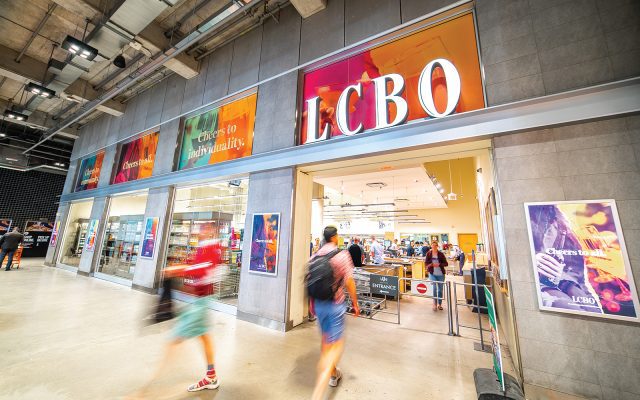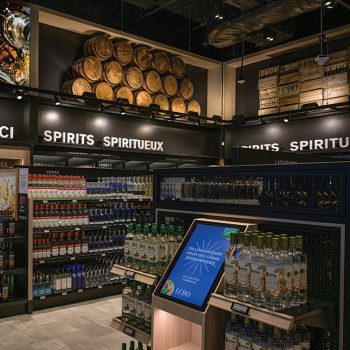What’s the future of the LCBO?
The Liquor Control Board of Ontario (LCBO) was hit by strike action last month. While the action has been resolved, the future of the government enterprise could be in doubt.

*This feature was originally published in the August 2024 issue of The Spirits Business magazine.
Last month was a tumultuous one for the Liquor Control Board of Ontario in Canada. On 5 July, approximately 10,000 Ontario Public Service Employees Union (OPSEU) employees went on strike – the first in LCBO’s 97-year history.
The LCBO’s hand was forced and resulted in the workers receiving an improved pay offer, a guarantee of no store closures, 1,000 new permanent part-time retail roles, and 60 permanent full-time jobs in logistics. The strike action came to an end after two weeks, with Ontarians able to stock up on spirits again when the LCBO’s 669 stores reopened on 23 July.
However, it did bring a certain age-old question back to the forefront: should spirits sales be modernised in Ontario? The province of Alberta moved to privatise its spirits sales in 1994, which in turn led to an explosion in the number of retail outlets there, and expanded consumer choice with a wider offering of products.
Ontario’s premier, Doug Ford, seems adamant about pursuing his plan for “alcohol everywhere”, improving access to booze throughout the province. His latest move to bring spirits-based ready-to-drink (RTD) products to grocery and convenience stores was particularly criticised by OPSEU, which claimed Ford was seeking to “dismantle the LCBO and hand billions in public revenues over to the big-box billionaires”.
The union also called Ford’s plan for alcohol to be made more widely available as “bad news for the province”.
During the strike negotiations, Ford said he would not backtrack on his decision to enable RTDs to be sold in convenience stores. “RTD is off the table,” Ford said. “Let me be very clear: it’s done, it’s gone, that ship has sailed, and it’s halfway across Lake Ontario.”
He went one step further by bringing the plan forward, allowing RTDs to be sold from the earlier date of 18 July instead of 1 August.
 Cal Bricker, president and CEO of Spirits Canada, which represents major spirits companies such as Pernod Ricard, Diageo, Campari and Brown-Forman, said the impact of the strikes on the spirits sector was “severe” and disrupted the supply chain. Bricker would “absolutely” like to see spirits sold more widely. He said: “We’d like to have the same access to points of sale as every other beverage.”
Cal Bricker, president and CEO of Spirits Canada, which represents major spirits companies such as Pernod Ricard, Diageo, Campari and Brown-Forman, said the impact of the strikes on the spirits sector was “severe” and disrupted the supply chain. Bricker would “absolutely” like to see spirits sold more widely. He said: “We’d like to have the same access to points of sale as every other beverage.”
Critics of a move to privatisation of alcohol sales claim that it would lead to lower government revenue. The LCBO brings in a net income of CA$2.5 billion (US$1.8bn) to the public’s coffers annually, which is then used by the province on services such as health care and education. The money that the LCBO returns to the province is a combination of taxes and fees charged on the products bought, warehoused, distributed, and sold via the LCBO.
However, Bricker says the government would not lose a substantial amount of revenue because of mark-ups and taxes. “They also have to pay for all the costs associated with the LCBO, and what happens in an environment when all that goes away? All that money goes back to the government. You’re not funding any more LCBO employees – there’s something like 8,000 – all those costs of goods. It’s no longer yours anymore. It’s the retailers that have to deal with it. So the truth is they’re going to make substantially more money. There have been lots of studies done. If they adopted the Alberta model, for example, the numbers I’ve seen, there could be like CA$3 million to CA$400m more a year that they could bring in in revenue.”
Bricker adds: “The LCBO is maintained just to do spirits. Why treat them different than other beverage alcohol types? You’re talking about the entire system being an anachronism, rooted in the mythology of Prohibition. There’s no earthly reason to do it.”
During the strike, Ontarians could buy bottles of spirits directly from local distilleries, or by ordering from the LCBO online. That provided a welcome boost in footfall for some distilleries, such as Spring Mill Distillery in Guelph, which operates an on-site retail store and an e-commerce site to sell its spirits. Cooper Sleeman, director of sales and marketing says: “Our retail store has seen a jump in the number of customers visiting, which is great because we’re trying to build a brand. A good percentage of the people that are coming in are people that may live very close, like around the corner, but never come in because they’ve never been forced to. We’re getting a lot of brand exposure that way.” The majority of Spring Mill’s products are listed with the LCBO. He explains that the listing process can be “quite extensive, and take quite a bit of time” and that sales quotas also must be met.
Most of the spirits sold by the LCBO are made by multinational companies, the majority of which refused to comment or did not respond about the strike action when approached by The Spirits Business. The LCBO also denied an interview request.
Davin de Kergommeaux, author of Canadian Whisky, The Essential Portable Expert, believes that there are no benefits to keeping the LCBO running, from both the consumer and producer point of view.
He explains: “We would tremendously increase the selection of alcoholic beverages in Ontario if we privatised. If we did, we would not have these great, big, beautiful, expensive stores. Selling that real estate is valuable real estate; they can get a short-term return simply by selling it. But it’s expensive to maintain. We could have alcohol being sold by people whose business is to sell retail goods to consumers instead of the government. We would lose the union, some retail outlets are unionised as well, but we would lose those jobs. So the union is going to squawk like crazy. But we’re not going to lose bodies doing work; they would increase.”
He adds that if the LCBO were shuttered, the thousands of jobs would “go to the 5,000 or 6,000 small retailers who are going to be selling alcohol”.
A lot of alcohol sales are done in the spur of the moment, he adds: “The spirits producers are saying that they’re at a disadvantage because when you go to the Loblaws [Canadian supermarket chain], you can buy wine and beer, but you can’t buy spirits, and they feel that they’re at a disadvantage.”
Retroactive tax bill
Another challenge facing the LCBO is legal action from members of Spirits Canada over million-dollar retroactive penalties. In May 2024, Spirits Canada claimed the LCBO was “clawing back payments” on products that were sold last year, based on claims that Quebec’s liquor board, Société des Alcools du Québec, received similar products for a lower price. The collective has now filed a court application with the Ontario Superior Court of Justice to declare the LCBO’s action as “invalid and unenforceable”.
Simultaneously, the suppliers have informed the Competition Bureau of Canada that the LCBO’s enforcement of this pricing term is an “abuse of dominance with major anti-competitive implications for pricing and product choice impacting all Canadian consumers”.
Bricker says: “We have been left with no other options.”
In a statement, the LCBO called the claims made by Spirits Canada “inaccurate and highly misleading to consumers. By breaching the terms contained in our purchase order terms and conditions that require that LCBO receive the same or lower price as other Canadian liquor jurisdictions, LCBO customers are unfairly made to pay more for beverage alcohol than other consumers across the country. These are not retroactive tax bills, fines, nor penalties, but rather pricing chargebacks levied in accordance with terms of our long-term contracts. Our position remains that it would not be fair to let a few suppliers gouge Ontario consumers.”
Related news
Cocktail chat: Foco, Barcelona
